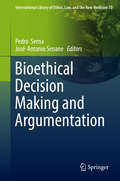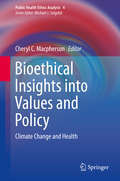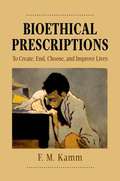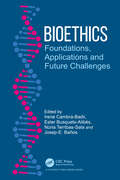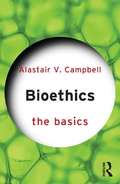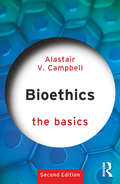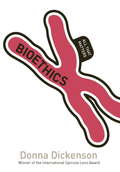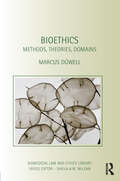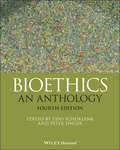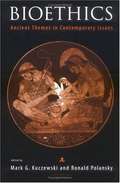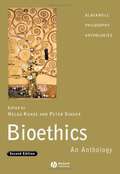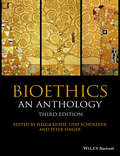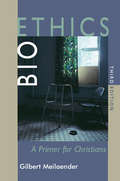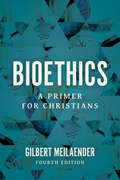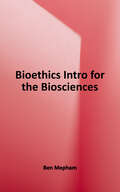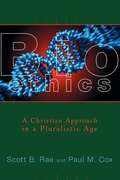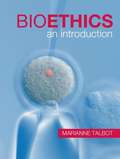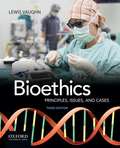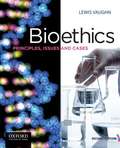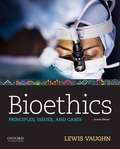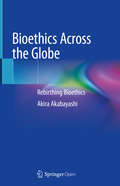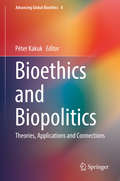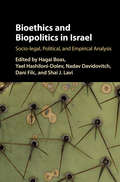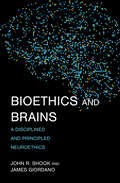- Table View
- List View
Bioethical Decision Making and Argumentation (International Library of Ethics, Law, and the New Medicine #70)
by Pedro Serna José-Antonio SeoaneThis book clarifies the meaning of the most important and pervasive concepts and tools in bioethical argumentation (principles, values, dignity, rights, duties, deliberation, prudence) and assesses the methodological suitability of the main methods for clinical decision-making and argumentation. The first part of the book is devoted to the most developed or promising approaches regarding bioethical argumentation, namely those based on principles, values and human rights. The authors then continue to deal with the contributions and shortcomings of these approaches and suggest further developments by means of substantive and procedural elements and concepts from practical philosophy, normative systems theory, theory of action, human rights and legal argumentation. Furthermore, new models of biomedical and health care decision-making, which overcome the aforementioned criticism and stress the relevance of the argumentative responsibility, are included.
Bioethical Insights into Values and Policy: Climate Change and Health (Public Health Ethics Analysis #4)
by Cheryl C. MacphersonChanges in earth's atmosphere, oceans, soil, weather patterns, and ecosystems are well documented by countless scientific disciplines. These manifestations of climate change harm public health. Given their goals and social responsibilities, influential health organizations recognize health impacts compounded by geography, social values, social determinants of health, health behaviors, and relationships between humans and environments primarily described in feminist ethics and environmental ethics. Health impacts are relevant to, but seldom addressed in bioethics, global health, public policy, or health or environmental policy. This book is the first to describe cultural, geographic, and socioeconomic factors that influence the regional significance of these impacts and frame them for bioethics and policy analyses.
Bioethical Prescriptions: To Create, End, Choose, and Improve Lives
by F. M. KammBioethical Prescriptions collects F. M. Kamm's articles on bioethics, which have appeared over the last twenty-five years and which have made her among the most influential philosophers in this area. Kamm is known for her intricate, sophisticated, and painstaking philosophical analyses of moralproblems generally and of bioethical issues in particular. This volume showcases these articles - revised to eliminate redundancies - as parts of a coherent whole. A substantive introduction identifies important themes than run through the articles. Section headings include Death and Dying; Early Life (on conception and use of embryos, abortion, andchildhood); Genetics and Other Enhancements (on cloning and other genetic technologies); Allocating Scarce Resources; and Methodology (on the relation of moral theory and practical ethics).
Bioethics: Foundations, Applications and Future Challenges
by Irene Cambra-Badii Ester Busquets-Alibés Terribas-Sala Núria Josep-E. BañosThe aim of this book is to introduce and discuss bioethics in a three-synergistic way: from the foundations to the current debates in relation to healthcare and social bioethics, and thereafter the possible future challenges. In this sense, the target audience can be from diverse disciplines: life and medical sciences, law, philosophy, psychology, and education. The book will be useful to high school students, in their first contacts with bioethics, college students, teachers and researchers, and the general public interested in these controversial debates of the past, present and future of bioethics.
Bioethics: The Basics
by Alastair V. CampbellBioethics: The Basics is an introduction to the foundational principles, theories and issues in the study of medical and biological ethics. Readers are introduced to bioethics from the ground up before being invited to consider some of the most controversial but important questions facing us today. Topics addressed include: The range of moral theories underpinning bioethics Arguments for the rights and wrongs of abortion, euthanasia and animal research Healthcare ethics including the nature of the practitioner-patient relationship Public policy ethics and the implications of global and public health Concise, readable and authoritative, this is the ideal primer for anyone interested in the study of bioethics.
Bioethics: The Basics (The Basics)
by Alastair V. CampbellBioethics: The Basics is an introduction to the foundational principles, theories and issues in the study of medical and biological ethics. Readers are introduced to bioethics from the ground up before being invited to consider some of the most controversial but important questions facing us today. Topics addressed include: the range of moral theories underpinning bioethics arguments for the rights and wrongs of abortion, euthanasia and animal research health care ethics including the nature of the practitioner-patient relationship public policy ethics and the implications of global and public health ‘3 parents’, enhancement, incidental findings and nudge approaches in health care. This thoroughly revised second edition provides a concise, readable and authoritative introduction for anyone interested in the study of bioethics.
Bioethics: All That Matters
by Donna DickensonIn this book:Donna Dickenson - Winner of the International Spinoza Lens AwardShould we do what ever science lets us do?Bioethics: All That Matters, new developments in biotechnology like genetics, stem cell research and artificial reproduction arouse both our greatest hopes and our greatest fears. Many people invest the new biotechnology with all the aspirations and faith once accorded to religious salvation. But does everyone benefit equally from scientific progress? Commercialised modern biomedicine runs the risk of exploiting vulnerable groups, from Indian 'surrogate' mothers to professional guinea pigs in drug research. Professor Dickenson argues that although we've entered new scientific territory, there's no need to jettison our existing moral sense. By discussing a range of real-life cases, she equips readers to make up their own minds on these important and controversial questions. Good science and good ethics needn't be contradictory.This accessible and concise book will appeal to both students and general readers, giving a fascinating introduction to a wide range of perspectives on Bioethics.All That Matters books:All books in the All That Matters series are written by world experts in their subject field. These experts work to distil a topic and get right to its heart, making the book accessible for both students and general readers. Each compelling book contains new and interesting perspectives and tells stories that matter.The Author:All That Matters - Interesting introductions to important issuesBooks on the following subjects are available from the All That Matters series: Muhammad, God, Water, Political Philosophy, Sustainability, Philosophy, Intelligence, Love, Russian Revolution, War, and Creativity.To find out more visit: www.allthatmattersbooks.com
Bioethics: Methods, Theories, Domains (Biomedical Law and Ethics Library)
by Marcus DüwellThis book is a philosophically-oriented introduction to bioethics. It offers the reader an overview of key debates in bioethics relevant to various areas including; organ retrieval, stem cell research, justice in healthcare and issues in environmental ethics, including issues surrounding food and agriculture. The book also seeks to go beyond simply describing the issues in order to provide the reader with the methodological and theoretical tools for a more comprehensive understanding of current bioethical debates. The aim of the book is to present bioethics as an interdisciplinary field, to explore its close relation to other disciplines (such as law, life sciences, theology and philosophy), and to discuss the conditions under which bioethics can serve as an academically legitimate discipline that is at the same time relevant to society. As a systematic and methodologically rigorous overview, Bioethics: Methods, Theories and Principles will be of particular interest to academics and students in the disciplines of Law, Medicine, Ethics and Philosophy. 'This is a book that embraces neither a single ethical theory nor a pragmatic melange of just-so-principles. It is a thoughtful and engaging analysis of diverse theoretical foundations in Bioethics. It is also an enormous step towards conceptual and philosophical clarity in this fascinating area.' - Professor Christian Illies, Chair for Practical Philosophy at the Otto-Friedrich University Bamberg, Germany
Bioethics: An Anthology (Blackwell Philosophy Anthologies #27)
by Udo Sch Klenk Peter SingerThe new edition of the classic collection of key readings in bioethics, fully updated to reflect the latest developments and main issues in the field For more than two decades, Bioethics: An Anthology has been widely regarded as the definitive single-volume compendium of seminal readings on both traditional and cutting-edge ethical issues in biology and medicine. Acclaimed for its scope and depth of coverage, this landmark work brings together compelling writings by internationally-renowned bioethicist to help readers develop a thorough understanding of the central ideas, critical issues, and current debate in the field. Now fully revised and updated, the fourth edition contains a wealth of new content on ethical questions and controversies related to the COVID-19 pandemic, advances in CRISPR gene editing technology, physician-assisted death, public health and vaccinations, transgender children, medical aid in dying, the morality of ending the lives of newborns, and much more. Throughout the new edition, carefully selected essays explore a wide range of topics and offer diverse perspectives that underscore the interdisciplinary nature of bioethical study. Edited by two of the field’s most respected scholars, Bioethics: An Anthology: Covers an unparalleled range of thematically-organized topics in a single volume Discusses recent high-profile cases, debates, and ethical issues Features three brand-new sections: Conscientious Objection, Academic Freedom and Research, and Disability Contains new essays on topics such as brain death, life and death decisions for the critically ill, experiments on humans and animals, neuroethics, and the use of drugs to ease the pain of unrequited love Includes a detailed index that allows the reader to easily find terms and topics of interest Bioethics: An Anthology, Fourth Edition remains a must-have resource for all students, lecturers, and researchers studying the ethical implications of the health-related life sciences, and an invaluable reference for doctors, nurses, and other professionals working in health care and the biomedical sciences.
Bioethics: Ancient Themes in Contemporary Issues
by Mark G. Kuczewski Ronald M. PolanskyThis collection of essays explores themes from ancient Greek philosophy and medicine and their implications for contemporary medicine and bio-medical ethics. Thus the work examines the relationship of two of the most popular areas in the current revival of ethics, namely, classical ethics and biomedical ethics--areas that have seldom been brought together in any serious or sustained way. The essays in this volume are written by established classical scholars and bioethicists.
Bioethics: An Anthology (Second Edition)
by Helga Kuhse Peter SingerThe expanded and revised edition of Bioethics: An Anthology is a definitive one-volume collection of key primary texts for the study of bioethics. Brings together writings on a broad range of ethical issues relating such matters as reproduction, genetics, life and death, and animal experimentation. Now includes introductions to each of the sections. Features new coverage of the latest debates on hot topics such as genetic screening, the use of embryonic human stem cells, and resource allocation between patients. The selections are independent of any particular approach to bioethics. Can be used as a source book to complement A Companion to Bioethics (1999).
Bioethics
by Helga Kuhse Peter Singer Udo SchüklenkNow fully revised and updated, Bioethics: An Anthology, 3rd edition, contains a wealth of new material reflecting the latest developments. This definitive text brings together writings on an unparalleled range of key ethical issues, compellingly presented by internationally renowned scholars. The latest edition of this definitive one-volume collection, now updated to reflect the latest developments in the field Includes several new additions, including important historical readings and new contemporary material published since the release of the last edition in 2006 Thematically organized around an unparalleled range of issues, including discussion of the moral status of embryos and fetuses, new genetics, neuroethics, life and death, resource allocation, organ donations, public health, AIDS, human and animal experimentation, genetic screening, and issues facing nurses Subjects are clearly and captivatingly discussed by globally distinguished bioethicists A detailed index allows the reader to find terms and topics not listed in the titles of the essays themselves
Bioethics: A Primer for Christians, Third Edition
by Gilbert MeilaenderIn the face of continuing advances in medical research and treatment, bioethics remains a serious ongoing social concern. For nearly two decades Gilbert Meilaender’s Bioethics has offered discerning Christian guidance on a wide range of pressing issues in medical ethics. Now in its third edition, Meilaender’s Bioethics covers abortion, assisted reproduction, genetic research, suicide and euthanasia, human experimentation — and much more — in language that is theologically informed, straightforward, and clear. This new edition includes updated information throughout and an added discussion of the need to protect Christian conscience in the practice of medicine.
Bioethics: A Primer for Christians
by Gilbert MeilaenderAmid continuing advances in medical research and treatment, Gilbert Meilaender&’s Bioethics has long provided thoughtful guidance on many of society&’s most difficult moral problems—including abortion, assisted reproduction, genetic experimentation, euthanasia, and much more. In this fourth edition, Meilaender updates much of the data referenced in the book and responds directly to recent developments, such as the CRISPR/Cas9 method of gene editing. Christians seeking discernment in this new decade will appreciate Meilaender&’s circumspect writing and his ability to address the nuances of each issue while maintaining strong and clearly stated moral convictions.
Bioethics: An Introduction for the Biosciences
by Ben MephamBioethical issues remain front-page news, with debate continuing to rage over issues including genetic modification, animal cloning, and 'designer babies'. With public opinion often driven by media speculation, how can we ensure that informed decisions regarding key bioethical issues are made in a reasoned, objective way? Bioethics: An Introduction for the Biosciences offers a balanced, objective introduction to the field of bioethics, ideal for any biosciences student who is new to the subject. With a focus on developing the students' power of reasoning and judgement, the book presents different perspectives to common themes in an impartial way, fostering debate and discussion. The opening section, 'The Ethical Groundwork', introduces students to the nature of bioethics and ethical theory. The book goes on to lead students through a broad range of bioethical issues relating to people, animals, and food, before concluding with an overview of bioethics in practice. The current generation of students will become the next generation of decision makers. Bioethics: An Introduction for the Biosciences is the perfect introduction to a field with which every biosciences student should be familiar. Online Resource Centre The Online Resource Centre features: For registered adopters of the book: - Figures from the book in electronic format, ready to download For students: - A web link library and hyperlinked reference list, giving ready access to additional information sources; - Topical updates: extensive summaries of the latest developments in those topics covered in the book, ensuring that the reader can remain up-to-date at all times.
Bioethics: A Christian Approach in a Pluralistic Age
by Scott B. Rae Paul M. CoxThe authors assess various secular approaches to bioethics that are particularly influential today and develop a framework for a Christian approach to assist people in addressing the many pressing issues in the field. Throughout, the authors touch on the numerous debated issues in bioethics though they are primarily concerned to give an account of the central theological notions crucial to an informed Christian perspective on bioethics.
Bioethics
by Marianne TalbotProviding readers with the confidence needed to debate key issues in bioethics, this introductory text clearly explains bioethical theories and their philosophical foundations. Over 250 activities introduce topics for personal reflection, and discussion points encourage students to think for themselves and build their own arguments. Highlighting the potential pitfalls for those new to bioethics, each chapter features boxes providing factual information and outlining the philosophical background, along with detailed case studies that offer an insight into real-life examples of bioethical problems. Within-chapter essay questions and quizzes, along with end-of-chapter review questions, allow students to check their understanding and to broaden their thinking about the topics discussed. The accompanying podcasts by the author (two of whose podcasts on iTunesU™ have attracted over 3 million downloads) explain points that might be difficult for beginners. These, along with a range of extra resources for students and instructors, are available at www. cambridge. org/bioethics.
Bioethics: Principles, Issues, And Cases, Third Edition
by Lewis VaughnBioethics: Principles, Issues, and Cases, Third Edition, explores the philosophical, medical, social, and legal aspects of key bioethical issues. Opening with a thorough introduction to ethics, bioethics, and moral reasoning, it then covers influential moral theories and the criteria forevaluating them. Integrating eighty-nine readings - twelve of them new to this edition - numerous classic bioethical cases, and abundant pedagogical tools, this text addresses the most provocative and controversial topics in bioethics. PEDAGOGICAL FEATURES:* "Classic Case Files" describe landmark cases that shaped the debate, while news-making "Cases for Evaluation" encourage students to form their own opinions* Various text boxes: "In Depth" boxes contain additional material, illustrations, or analyses, much of it "ripped from the headlines"; "Fact File" boxes provide statistics on the social, medical, and scientific facets of a chapter's topic; and "Legal Brief" boxes summarize important court rulingsand the status of major legislation* "Key Terms" are boldfaced and boxed off within the text and then defined in a glossary at the back of the book* "Applying Major Theories" sections at the end of each chapter help students relate theories to the issues
Bioethics: Principles, Issues, and Cases, Second Edition
by Lewis VaughnBioethics: Principles, Issues, and Cases, Second Edition, explores the philosophical, medical, social, and legal aspects of key bioethical issues. Opening with a thorough introduction to ethics, bioethics, and moral reasoning, it then covers influential moral theories and the criteria for evaluating them. Integrating eighty-five readings - thirteen of them new to this edition - numerous cases, and abundant pedagogical tools, the book addresses the most provocative and controversial topics in bioethics. Updated throughout, the second edition incorporates new information on justice, health care, and health insurance reform along with more coverage of issues related to race and culture and of the moral challenges facing nurses and other health care professionals. It also offers additional step-by-step guidance on how to identify and evaluate moral arguments in real-world contexts, with accompanying exercises and answers in an appendix.
Bioethics: Principles, Issues, And Cases
by Lewis VaughnThis book explores the philosophical, medical, social, and legal aspects of key bioethical issues. Opening with a thorough introduction to ethics, bioethics, and moral reasoning, it then covers influential moral theories and the criteria for evaluating them. Integrating eighty-seven readings--ten of them new to this edition--substantive introductions to each issue, numerous classic bioethical cases, and abundant pedagogical tools, this text addresses the most provocative and controversial topics in bioethics.
Bioethics Across the Globe: Rebirthing Bioethics
by Akira AkabayashiThis open access book addresses a variety of issues relating to bioethics, in order to initiate cross-cultural dialogue. Beginning with the history, it introduces various views on bioethics, based on specific experiences from Japan. It describes how Japan has been confronted with Western bioethics and the ethical issues new to this modern age, and how it has found its foothold as it decides where it stands on these issues. In the last chapter, the author proposes discarding the overarching term ‘Global Bioethics’ in favor of the new term, ‘Bioethics Across the Globe (BAG)’, which carries a more universal connotation. This book serves as an excellent tool to help readers understand a different culture and to initiate deep and genuine global dialogue that incorporates local and global thinking on bioethics. Bioethics Across the Globe is a valuable resource for researchers in the field of bioethics/medical ethics interested in adopting cross-cultural approaches, as well as graduate and undergraduate students of healthcare and philosophy.
Bioethics and Biopolitics: Theories, Applications and Connections (Advancing Global Bioethics #8)
by Péter KakukThis volume links three different theoretical approaches that have a common focus on the relationship between biopolitics and bioethics. This collection of papers can be categorized into different domains that are representative of the contemporary usage of biopolitics as a concept. On the one hand, several chapters develop a clear and up-to-date understanding of the primary sources of the concept and related theories of Agamben, Negri or Foucault and approach the question of relevance within the field of bioethics. Another group of papers apply the philosophical concepts and theories of biopolitics (biopower, Homo Sacer, biocitizenship) on very specific currently debated bioethical issues. Some scholars rely on the more mundane understanding of (bio)politics and investigate how its relationship with bioethics could be philosophically conceptualized. Additionally, this work also contains papers that follow a more legally oriented analysis on the effects of contemporary biopolitics on human rights and European law. The authors are philosophers, legal scholars or bioethicists. The major strength of this volume is to provide the reader with major insights and orientation in these different contemporary usages of the concept and theories of biopolitics, within the context of its various ethically relevant applications.
Bioethics and Biopolitics in Israel: Socio-legal, Political, and Empirical Analysis
by Shai J. Lavi Hagai Boas Hashiloni-Dolev Yael Nadav Davidovitch Dani FilcAlthough the 'Israeli case' of bioethics has been well documented, this book offers a novel understanding of Israeli bioethics that is a milestone in the comparative literature of bioethics. Bringing together a range of experts, the book's interdisciplinary structure employs a contemporary, sociopolitical-oriented approach to bioethics issues, with an emphasis on empirical analysis, that will appeal not only to scholars of bioethics, but also to students of law, medicine, humanities, and social sciences around the world. Its focus on the development of bioethics in Israel makes it especially relevant to scholars of Israeli society - both in and out of Israel - as well as medical practitioners and health policymakers in Israel.
Bioethics and Brains: A Disciplined and Principled Neuroethics (Basic Bioethics)
by John R. Shook James GiordanoHow neuroethics can be increasingly relevant and informative for inclusive social policy and political discourse about brain science and technologies.Neuroethics, a field just over two decades old, addresses both ethical issues generated in and by brain sciences and the neuroscientific studies of moral and ethical thought and action. These foci are reciprocally interactive and prompt questions of how science and ethics can and should harmonize. In Bioethics and Brains, John R. Shook and James Giordano ask: How can the brain sciences inform ethics? And how might ethics guide the brain sciences and their real-world applications?The authors&’ structure for a disciplined neuroethics reconciles science and ethics by requiring ethical principles consistent with moral neuroscience and moral psychology. Their cosmopolitan perspective looks beyond Western theories toward a new metaethics for neuroethics and illustrates its approach in chapters that address the issues and approaches to questions and problems generated by the proliferation of neurotechnology in global contexts. Shook and Giordano posit that neuroethics can merge science and ethics toward establishing global consensus on guiding brain research, neurotechnological innovation, and grounding neurorights.
Bioethics and Disability
by Alicia OuelletteBioethics and Disability provides tools for understanding the concerns, fears, and biases that have convinced some people with disabilities that the health care setting is a dangerous place and some bioethicists that disability activists have nothing to offer bioethics. It wrestles with the charge that bioethics as a discipline devalues the lives of persons with disabilities, arguing that reconciling the competing concerns of the disability community and the autonomy-based approach of mainstream bioethics is not only possible, but essential for a bioethics committed to facilitating good medical decision making and promoting respect for all persons, regardless of ability. Through in-depth case studies involving newborns, children, and adults with disabilities, Bioethics and Disability proposes a new model for medical decision making that is both sensitive to and sensible about the fact of disability in medical cases. Disability-conscious bioethics will bring together disability experts and bioethicists to identify and mitigate disability bias in our health care systems.
